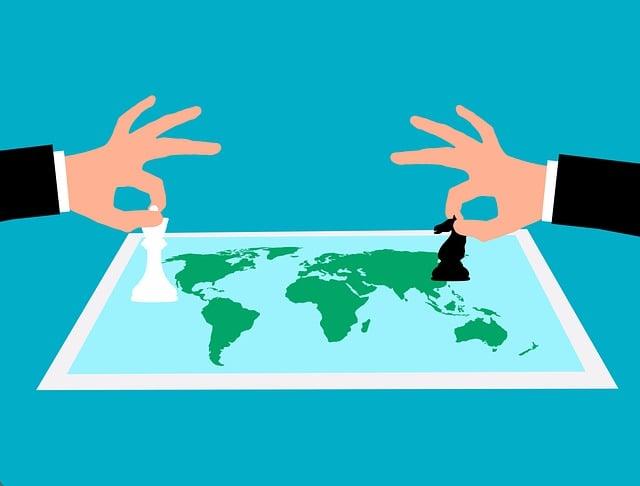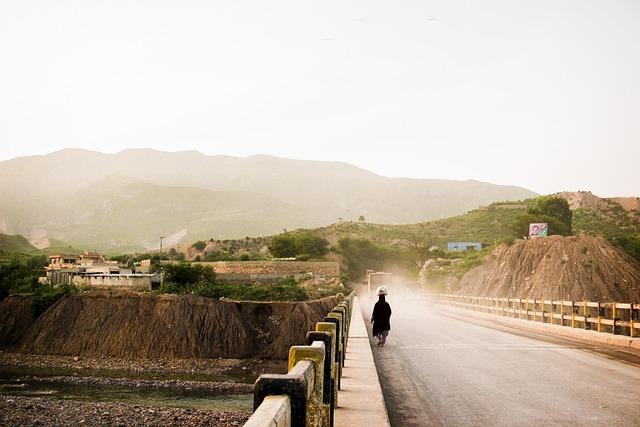In an era defined by shifting alliances and unpredictable global dynamics, the landscape of international relations presents a complex tapestry of challenges and opportunities. At the heart of this intricate framework lies Pakistan, a nation whose strategic position and historical ties have imbued it with a unique role on the world stage. From its borders with major players like India and Afghanistan to its relationships with powers such as China and the United States, Pakistan’s navigational prowess in the realm of geopolitics is both a reflection of its past and a blueprint for its future. As it confronts a myriad of challenges, from security dilemmas to economic hurdles, Pakistan’s journey unveils the delicate balance between sovereignty and collaboration. This article seeks to explore the multifaceted role of Pakistan in international relations, delving into how it maneuvers through the ever-evolving geopolitical landscape, striving to assert its identity and influence while charting a course toward stability and prosperity.
Understanding Pakistans Strategic Position in a Multipolar World
Pakistan’s geographical location places it at a crucial crossroads in South Asia, making it a pivotal player in the evolving dynamics of international relations. Its proximity to major powers such as China, India, and Russia positions it favorably for both strategic partnerships and regional influence. As the world shifts towards a multipolar framework, Pakistan’s ability to interact with various global players is paramount. This includes balancing its long-standing alliance with the United States while simultaneously strengthening ties with China through initiatives like the China-Pakistan Economic Corridor (CPEC). The following factors illustrate the nuances of Pakistan’s strategic positioning:
- Geographical Leverage: Control over key trade corridors and energy routes.
- Military Partnerships: Collaboration with both Western and Eastern military entities.
- Regional Stability: A brokered peace in Afghanistan can enhance Pakistan’s standing.
- Economic Opportunities: Access to emerging markets and regional trade agreements.
Moreover, Pakistan faces numerous geopolitical challenges that demand a multifaceted approach. The country must navigate its complex relationship with India, which remains a focal point of tension, especially concerning Kashmir. Additionally, the rise of non-state actors and internal security issues further complicate Pakistan’s regional ambitions. To address these challenges, Pakistan is focusing on enhancing its diplomatic outreach and employing soft power strategies, such as cultural diplomacy and economic cooperation initiatives. Strategic investments in infrastructure and human capital are also essential for consolidating its role on the global stage. The following table highlights key strategic initiatives:
| Strategic Initiative | Focus Area |
|---|---|
| CPEC | Economic development and connectivity |
| Afghan Peace Process | Regional stability and security |
| Military Alliances | Defense cooperation and joint exercises |
| Cultural Diplomacy | Enhancing soft power and public perception |

Challenges and Opportunities: Pakistan’s Response to Regional Tensions
Pakistan’s geopolitical landscape is strewn with complexities, presenting both challenges and opportunities amid rising regional tensions. The ongoing disputes with India over Kashmir, the deteriorating situation in Afghanistan, and the evolving dynamics with China and the United States create a multifaceted arena where responsive diplomacy is crucial. Pakistan’s military readiness and strategic partnerships, particularly with China through initiatives like the China-Pakistan Economic Corridor (CPEC), bolster its position, providing economic opportunities while mitigating some security risks. However, this also results in increased scrutiny from the West and necessitates a delicate balance in foreign relations.
In navigating these turbulent waters, Pakistan can harness a range of opportunities that arise from these challenges. Active engagement in multilateral forums, such as the South Asian Association for Regional Cooperation (SAARC) and the Organization of Islamic Cooperation (OIC), allows Pakistan to voice its concerns while fostering regional cooperation. Additionally, Pakistan’s pivotal geographic location serves as a gateway for trade routes, potentially positioning the nation as an economic hub connecting Asia, the Middle East, and beyond. Through focused initiatives, strategic diplomacy, and a commitment to peace-building, Pakistan can turn chaos into prospects, facilitating not just its national interests but also contributing to broader regional stability.

Leveraging Economic Diplomacy: Enhancing Pakistans Global Partnerships
In an era characterized by complex global dynamics, Pakistan has the opportunity to utilize economic diplomacy as a vital tool for fostering international relationships. By prioritizing strategic partnerships, Pakistan can create a framework focused on mutual benefit and sustainable growth. This involves engaging in multinational agreements and forging alliances that transcend traditional political boundaries. Key strategies include:
- Trade Agreements: Expanding free trade agreements to enhance export capabilities.
- Investment Initiatives: Attracting foreign direct investment by providing incentives and ensuring a stable business environment.
- Technological Collaboration: Partnering with other nations for technological exchange, boosting innovation and efficiency in key sectors.
Moreover, the importance of regional cooperation cannot be overstated, as it serves as a conduit for economic integration and stability. Initiatives such as the China-Pakistan Economic Corridor (CPEC) exemplify how targeted investments can play a transformative role in enhancing bilateral ties. To further reinforce these connections, the following components should be emphasized:
| Component | Impact |
|---|---|
| Infrastructure Development | Facilitates trade and improves connectivity. |
| Energy Projects | Addresses critical energy shortages, fostering economic growth. |
| Cultural Exchange | Strengthens people-to-people connections and mutual understanding. |

Strengthening Internal Unity: The Key to Effective Foreign Policy Implementation
In the landscape of foreign policy, the internal cohesion of a nation plays a pivotal role in how effectively it projects its interests on the global stage. For Pakistan, uniting various political factions, civil society, and stakeholders is crucial in creating a coherent foreign strategy that aligns with national priorities. By fostering a collaborative environment, the country can better strategize on pressing issues, such as regional security, trade partnerships, and climate change challenges. Key components that can enhance internal unity include:
- Dialogue and Collaboration: Establishing platforms for dialogue among political parties and civil society to ensure a shared vision.
- Inclusive Policy-Making: Engaging diverse voices in the formulation of foreign policy to reflect the multi-faceted nature of national interests.
- Consistent Communication: Maintaining transparency and regular updates on foreign policy directions to build trust and support among the populace.
This internal alignment not only strengthens the nation’s negotiating position but also enables Pakistan to navigate complex geopolitical landscapes with greater agility. The effectiveness of its foreign policy can be measured through collaborative efforts with international partners, which are contingent upon a unified home front. To illustrate the interconnectedness of this unity, the table below outlines some critical geopolitical areas and how internal instability can hinder diplomatic effectiveness:
| Geopolitical Area | Potential Impact of Internal Disunity |
|---|---|
| Regional Security | Inconsistent policies may embolden adversaries. |
| Trade Relations | Less attractive for foreign investors due to perceived instability. |
| Global Alliances | Weakened partnerships result from lack of a unified stance. |
Insights and Conclusions
As the sun sets on a complex tapestry woven with threads of diplomacy, conflict, and resilience, Pakistan finds itself at a crossroads, navigating the intricate labyrinth of international relations. Each challenge faced is not merely an obstacle but an opportunity for growth and collaboration, further defining the nation’s role on the global stage.
In a world where alliances shift like sand and crises unfold with relentless speed, Pakistan’s strategic position can either fortify its influence or redefine its relationships. The journey ahead promises to be as unpredictable as the geopolitical landscape itself. Yet, with a blend of historical insights and contemporary strategies, Pakistan stands poised to embrace its multifaceted identity—bridging East and West, tradition and innovation, challenge and opportunity.
As we watch this narrative unfold, one thing remains clear: Pakistan’s story is far from over. The choices made today will ripple through the corridors of history, shaping not only the nation’s future but also the collective destiny of the world. It is a dance of diplomacy and determination, and Pakistan is determined to lead with purpose.



